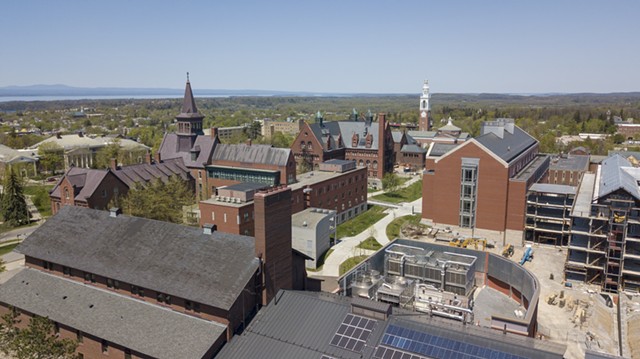
- File: James Buck
- The University of Vermont campus
The University of Vermont has proposed a series of cost-cutting initiatives that include trimming hours for some faculty in an attempt to absorb coronavirus-related losses and brace for further financial uncertainty.
UVM president Suresh Garimella informed lawmakers earlier this month that the university had lost millions of dollars this spring
after sending students home early due to the pandemic.
"The biggest challenge in my mind is that things are uncertain," he told the Senate Education Committee earlier this month. "We cannot quite put a number on it — if we could, it would be easier to plan for. So there's a whole bunch of scenario and contingency planning going on."
Garimella later requested a $25 million appropriation from Vermont's $1.25 billion federal stimulus funds, a cash injection he hoped would cover the losses and help the university prepare for an anticipated uptick in financial aid requests from families impacted by the virus.
But that money is not guaranteed, especially now that lawmakers are
considering a similarly priced bailout for the ailing state college system. And UVM may eventually need to cough up even more money in response to a
class-action lawsuit from students who say they were not properly compensated for being forced to finish the semester at home.
Meantime, UVM and colleges across the country are bracing for further unanticipated costs — for good reason. Though Garimella announced on Wednesday that the university
would resume in-person classes this fall, recent national surveys suggest that four-year institutions like UVM could
lose up to 20 percent of their fall enrollment due to uncertainty caused by the pandemic.
UVM's board of trustees adopted an interim, three-month spending plan in early April to give campus leaders time to better project the fiscal fallout. Administrators have since announced several cost-cutting measures, such as a freeze on all new hires. They also asked deans to find savings within their respective budgets.
"Each dean is making their own decision based on their budget and student demand," UVM spokesperson Enrique Corredera said in a statement to
Seven Days. "This year, we are being particularly careful to not over-commit ourselves, while still enabling faculty to maintain their benefits."
The proposals were outlined in memos sent to faculty this week, which noted that some deans have agreed to take a pay cut of roughly 8 percent.
William Falls, the dean of UVM's College of Arts and Sciences, said that he planned to cut workloads for non-tenure track faculty by 25 percent, which would cut their pay but allow them to maintain benefits. The college also expects to delay sabbaticals and reduce administrative stipends, among other measures.
"My hope is that the financial impact of the pandemic will be moderate and short-lived and that it will be possible to reverse some or all of these measures in the near future," Falls wrote in the memo sent Monday.
Scott Thomas, interim dean of the College of Nursing and Health Sciences and dean of the College of Education and Social Services, told faculty that all pending hiring decisions would be delayed until at least Friday, May 1. He said part-time hires would only be allowed in "exceptional circumstances."
UVM's dean of libraries, Bryn Geffert, said he plans to hold all vacant positions open and "delay concrete strategic planning" until the university's financial picture becomes clearer. And at the College of Agriculture and Life Sciences, interim dean Jean Harvey told faculty that tenure-track faculty and lecturers would take on higher workloads to scale back or eliminate the need for part-time lecturers.
"The Deans have spent a lot of time talking about this," Harvey wrote. "But in the end, we are trying to do what's best for our colleges; maintain exceptional academic and research support while also providing long-term financial sustainability."
"To the extent possible," she continued, "we are also committed to preserving positions at the University."
Julie Roberts, a linguistics professor and president of United Academics, UVM's faculty union, said she was not surprised to hear about the budget cuts. But she had hoped for a more collaborative approach and said that the union believes the reductions would be better spread across the entire faculty.
"Basically, what they've done so far is that most of the burden of the pandemic is being now carried by our non-tenure track faculty, which seems like a very bad idea," she said.
More than 600 people who have signed an online petition agreed. The petition, created by UVM student Chris Harrell, calls on university leaders to ditch the staffing cuts and find another way to balance its budget.
"If they do not, we will be forced to take more aggressive action to ensure the quality of our education and protect the livelihoods of our faculty," the petition reads.
Roberts said the union is planning a virtual town hall on Friday to discuss the pay cuts. She said the deans' decision to forgo some of their pay is a "move in the right direction." But non-tenure faculty are taking a much larger hit, she said, "and they had a lot less to start with."
Comments
Comments are closed.
From 2014-2020, Seven Days allowed readers to comment on all stories posted on our website. While we've appreciated the suggestions and insights, right now Seven Days is prioritizing our core mission — producing high-quality, responsible local journalism — over moderating online debates between readers.
To criticize, correct or praise our reporting, please send us a letter to the editor or send us a tip. We’ll check it out and report the results.
Online comments may return when we have better tech tools for managing them. Thanks for reading.